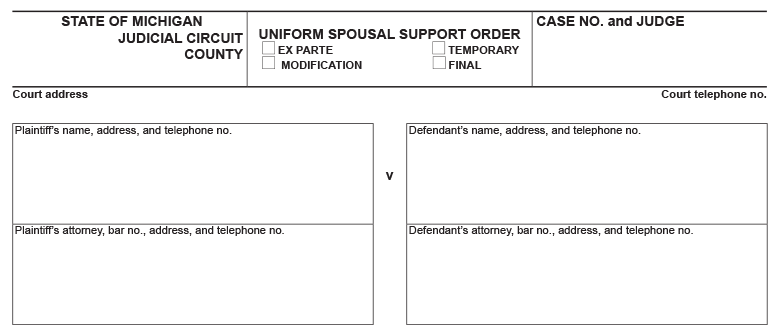
Partner, Divorce Lawyer
Alimony in Michigan
The divorce process is an emotional experience for all involved parties. Couples may feel periods of great stress, depression, anxiety, anger, or confusion. While riding this emotional roller coaster, the divorcing pair must make important decisions regarding splitting marital assets. Also, each party must look at an equitable division of future earnings such as retirement benefits.
The future well-being of each party is one factor the judge considers when evaluating the need for alimony. It’s important to note, that even though Michigan is a “no fault” divorce state, judges may consider fault when determining alimony payments. So, before you file for divorce, or, as soon as you are served with divorce papers, contact an experienced family law attorney to discuss your case.
This article discusses Michigan spousal support and alimony laws. It’s important to note that information within this page can help guide someone in the right direction and answer general questions; however, this is not a substitute for professional legal advice. If you have legal issues related to spousal support, consulting with a family law/alimony attorney is advised.
Michigan Alimony Laws

Michigan alimony laws allow for spousal support payments from one party to another in a divorce to maintain a similar standard of living or aid the receiving party towards becoming self-sufficient. The amount and duration of alimony are determined based on various factors like the duration of the marriage, the parties’ ages, their ability to work, their financial needs, and the ability of the other party to pay. The court has a broad discretion in determining alimony, and it can be modified later if circumstances change significantly.
According to the Michigan Legislature Section 552.13 on Alimony,
“In every action brought, either for a divorce or for a separation, the court may require either party to pay alimony for the suitable maintenance of the adverse party, to pay such sums as shall be deemed proper and necessary to conserve any real or personal property owned by the parties or either of them, and to pay any sums necessary to enable the adverse party to carry on or defend the action, during its pendency. It may award costs against either party and award execution for the same, or it may direct such costs to be paid out of any property sequestered, or in the power of the court, or in the hands of a receiver.” (Michigan Legislature, 2023, 552.13 Alimony; costs; termination.)
What is Spousal Support?
Spousal support, or alimony is a payment of money, assets, or property from one spouse to another as part of a divorce settlement. Many people believe spousal support only goes to women. This is not true. The goal of alimony is to ensure that both spouses are able to financially support themselves and property and assets are divided equally.
There are different types of support and each type may be modifiable or non-modifiable. Modifiable support may be altered if the payer has a change of circumstances. For example, if the ex-spouse loses a job or is permanently disabled the court may lower the alimony payment. On the other hand, the amount may be increased at a later date.
Non-modifiable spousal support may not be altered. Generally speaking, one should proceed with caution in regards to non-modifiable alimony. Of course, your attorney will advise you which type is best.
Factors Affecting Spousal Support
Michigan judges consider various factors when determining the necessity and amount of spousal support. This process is more complicated than calculating child support payments. Since child support relies on a mathematical formula based on percentage of income, it’s fairly straightforward. However, spousal support must consider numerous factors including:
- Length of marriage- A one year marriage would rarely receive alimony. However, a long term marriage is a likely recipient of spousal support.
- Age of parties
- Assets involved
- Previous standard of living
- The ability of parties to pay alimony
- The health of each party
- The property involved
- Equity
- Did one spouse contribute to the divorce
Types of Alimony
Michigan has four main types of alimony: temporary, periodic, permanent, or lump sum payment. Sometimes a judge may order a combination of the four kinds. For example, the judge may order the house payment to be made for one year and an alimony payment to be made permanently. When one spouse has more assets, or income than the other spouse, support is often ordered as follows:
- Temporary- As the name indicates this type of support lasts for a specific amount of time. For example, a judge may order the higher earning spouse to pay all bills until the divorce is final. Then, the temporary order may expire. At that time, a new spousal order may take effect, or not.
- Periodic- This kind of order helps one spouse obtain training or education. The judge may order one party to pay for the other’s education. This type of support is often used if one person stayed home to care for children and has been out of the workforce. This lasts until the nonworking spouse obtains gainful employment.
- Permanent- When there is no prenuptial agreement and one spouse requires financial assistance, a judge will order permanent spousal support. Long term marriages and older couples often fall into this category.
- Lump Sum Payment- This rarely happens. However, sometimes couples want to split everything at the time of divorce. Basically, all assets including retirement funds, property, cash, and other monetary goods are equitably divided between the two parties.
Frequently Asked Questions
Q. Does Michigan have alimony?
Yes, Michigan has provisions for alimony, known as spousal support, aimed at providing financial assistance to a lower-earning or non-earning spouse during or after a divorce.
Q. How does alimony work in Michigan?
In Michigan, the court evaluates various factors such as each party’s income, age, health, and the duration of the marriage to determine the necessity, amount, and duration of spousal support.
Q. Is alimony permanent?
Alimony can be permanent or temporary in Michigan, with permanent alimony being less common and usually awarded in long-term marriages or when one party has significant needs.
Q. How long does alimony last in michigan?
The length of alimony in Michigan is determined by the court and may last for a few years or until a significant event occurs like the remarriage of the recipient.
Michigan Family Law & Alimony Attorney
Due to the complex nature of calculating spousal support, it remains vital to hire an experienced family law attorney. Your attorney will protect your rights and ensure all paperwork is filed in a timely manner. Going through a divorce is an emotional experience. Often, even folks with great common sense may make mistakes if they attempt to navigate the courts on their own. In fact, do not “share” an attorney with your soon to be ex-spouse. In conclusion, contact an experienced family law attorney that specializes in divorce cases.
Ryan previously served as President for both the WLAM and the Women’s Bar Association. She has also been selected by colleagues as a Top Lawyer in Michigan on multiple occasions and is recognized among the top 10 lawyers under 40 by the National Academy of Family Law Attorneys. She contributes regularly to the Institute of Continuing Legal Education (ICLE) as a speaker on issues involving family law and child support.




